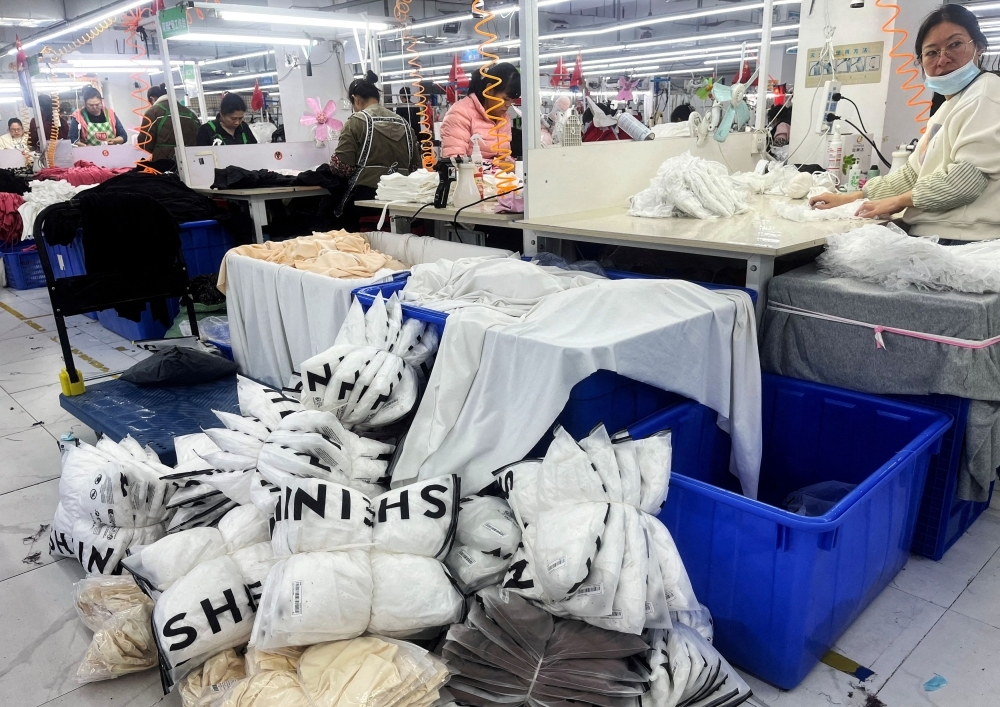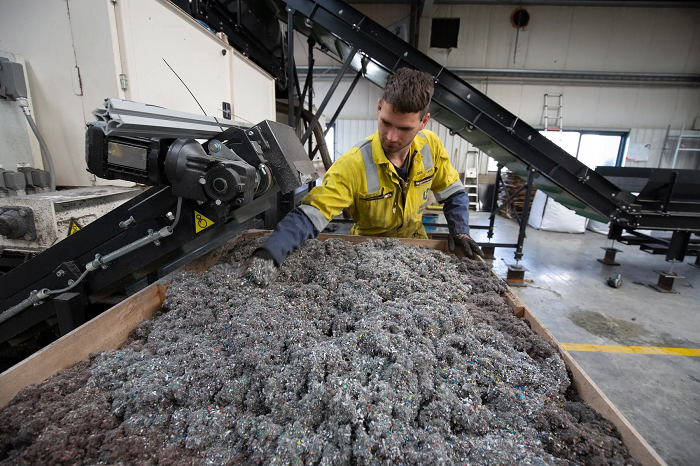FW
Womenswear and lifestyle label, Club L London has launched its maiden collection on Middle East's premier luxury e-commerce platform, Ounass. A crucial step in the brand’s global expansion, this move strengthens its formal presence in the region’s premium retail market.
From its Emimence collection, Club L London features a curated selection on the platform offering exclusive styles that showcase its signature elevated occasionwear and modest-inspired silhouettes.
The brand plans to design future seasonal edits specifically for the Middle East. Furthermore, it aims to invest in the region through influencer collaborations, pop-up experiences, and targeted campaigns.
Katie Randev, Founder and CEO, Club L London, states, the brands’ partnership with the luxury fashion platform Ounass reflects a strong market demand. Being part of this curated platform reflects the strength of the brand’s customer base and the appetite for elevated occasionwear across the region, she adds.
This launch follows a landmark year for the brand, which saw impressive international expansion and revenue growth, including more than 300 per cent Y-o-Y growth in the Middle East region alone. With 10 international websites now live, including dedicated sites for the UAE and Germany, the business is scaling rapidly, confirms Ramdev.
Voicing strong concerns regarding proposed restrictions on per- and polyfluoroalkyl substances (PFAS) in apparel to the New York State Department of Environmental Conservation (DEC), American Apparel & Footwear Association (AAFA) has urged the department to reconsider the extremely low proposed limits and to explicitly exempt products made with recycled materials.
The DEC’s proposal suggested setting limits as low as 25 parts per billion (ppb) across ten specific PFAS substances for all apparel products and components. Chelsea Murtha, Senior Director-Sustainability, AAFA, argued this is not only inordinately expensive but is also inconsistent with other state laws. Testing for multiple specific analytes at such granular levels on every component, from zippers to screen prints, would create a tremendous strain on both manufacturers and the department’s resources.
To promote a simpler, more unified regulatory landscape, the AAFA suggested, New York mirror California by adopting a single limit for Total Organic Fluorine (TOF). They recommend a TOF limit of 50 ppm, noting that a recent Notre Dame study found that a TOF result of less than 100 ppm indicates PFAS were not intentionally added. This TOF-only approach, which measures the total amount of organically bound fluorine, is preferred as low concentrations of specific PFAS analytes pose a low chance of exposure and may be present as unintentional trace contamination. The AAFA also requested that companies be allowed to provide evidence to rebut the presumption of intentionally added PFAS if they exceed the TOF limit.
Furthermore, the AAFA strongly advocated for the explicit exemption of products made with at least 50 per cent recycled content from the PFAS regulation. This is critical for promoting the DEC’s stated goal of creating a circular economy. Citing the Apparel and Footwear International RSL Management (AFIRM) Group, AAFA noted, it's currently not ‘economically viable’ for recyclers to sort out products containing PFAS, making a recycled content exemption necessary to enable the industry's shift toward sustainable and circular production.
Apparel imports by New Zealand slowed to 2.81 per cent Y-o-Y to NZ$1.425 billion during the January–August 2025 period. Imports of knitted or crocheted garments increased by 3.6 per cent during this eight-month period while non-knitted apparel imports experienced a 1.8 per cent modest rise. Fabric imports by the country grew by 22.5 per cent during the period.
However, New Zealand registered a 4 per cent Y-o-Y decline in apparel imports in August 2025 compared to the corresponding month in the previous year. Despite this dip, overall import trend indicates, the market remains resilient with imports projected to meet or slightly surpass 2024 levels, reflecting consistent consumer demand in the country.
Australia’s cotton export market faced a significant downturn in the first seven months of 2025, spanning January to July 2025.
The average price for Australia’s cotton exports declined to $1.81 per kg during this period, representing a 35.7 per cent contraction since 2022. This decline is a part of a consistent trend, following prices of $2.82 per kg in 2022, $2.52 per kg in 2023, and $2.09 per kg in 2024.
Compared to the average price of $2.17 per kg during the same period in 2024, the Y-o-Y reduction reflects both suppressed global consumption and competitive pressure from rival suppliers like the US and Brazil.
Consequently, the total export value declined by 46.3 per cent to $594.3 million. In terms of volume, exports slipped by 16.5 per cent to 327.6 million kg, down from 392.2 million kg in the first seven months of the previous year.
This drop in volume was primarily caused by a smaller domestic crop due to adverse weather in some growing regions, compounded by slower purchasing activity from major international buyers. Despite these challenges, Asia remains the primary destination for Australia’s cotton, with China leading the export share at 35.4 per cent, followed by Bangladesh, Vietnam, India, and Indonesia.
Manmade and Technical Textiles Export Promotion Council (MATEXIL) is set to host its 2nd Export Awards for Technical Textiles on November 19, 2025, at NESCO in Mumbai. The event will honor the outstanding export performance of technical textiles companies for FY23-24 and FY24-25.
The event is likely to be attended by Union Ministers, senior Government officials, and leaders of the technical textiles industry. According to Shaleen Toshniwal, Chairman, MATEXIL, the awards will recognize exporters across all 12 technical textiles segments including Agrotech, Buildtech, Clothtech, Geotech, Hometech, Indutech, Meditech, Mobiltech, Protech, Packtech, Sportech and Specialty Fiber
In addition to these category awards, two special honors -the MATEXIL Special Award and the Specialty & Innovative Technical Textiles Award - will be presented to promote innovation and excellence within the sector.
Pramod Khosla, Convenor, Sub-Committee for Technical Textiles, MATEXIL, notes, there is a need to support and motivate both existing and young exporters to drive growth in technical textiles exports. Recognizing their contributions will encourage the next generation to play a stronger role in India's growing global trade.
The event is likely to be attended by over 1,000 companies in the sector. This strong participation will help showcase the dynamism of the technical textiles industry in India, asserts Toshniwal.
The event aims to celebrate exporter achievements, inspire further innovation, and encourage the industry to reach greater heights in global markets.
Moscow Fashion Week, held from August 28 to September 2, 2025, wasn't just a showcase of beautiful clothing; it was a glimpse into the future of fashion. With the BRICS+ Fashion Summit running concurrently, the event served as a dynamic platform where creativity, sustainability, and cutting-edge technology converged. This season, designers embraced a forward-thinking approach, using AI, 3D printing, and upcycling to create collections that were both innovative and responsible.
AI-Powered couture

The most striking example of the fusion of fashion and technology was Mandragora's show, "Al Collection 1869/2025. Digital Heritage." In a groundbreaking collaboration with Sber, the brand reimagined an unfinished opera by Pyotr Tchaikovsky. The collection's libretto was co-written by the GigaChat AI, the musical score was composed by SymFormer AI, and the scenography was designed by Kandinsky AI. This project demonstrated how human artistry can guide artificial intelligence to create new forms of high art, merging a historical narrative with a truly futuristic vision.
Sustainability and upcycling
Designers also addressed the critical topic of sustainability, turning old materials into new, covetable pieces.

Alexander Arutyunov's collection was a deeply personal statement, created entirely from the brand's archival fabrics. He described it as a personal decision to "stop the flow of the new" and look inward, showcasing how a beautiful collection can be built from what already exists.

The Omsk-based brand Katler specialized in upcycling with its "Reimagine" collection, transforming seemingly identical silhouettes into one-of-a-kind creations.

Boyari showcased sustainable materials like Appleskin and Tencel,

while Alena Cojocaru's designs for Empress Catherine II were enhanced with upcycled elements from her own archives.
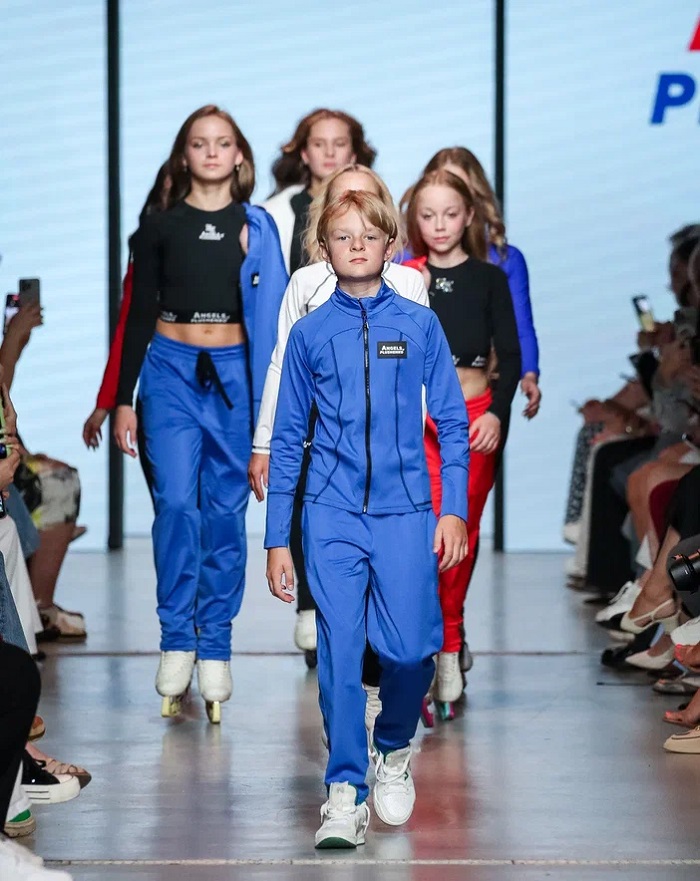
Even in children's fashion, Katee's Kids collaborated with figure skating legend Evgeni Plushenko on a sportswear line that was both functional and mindfully produced.
Futuristic and avant-garde
The runway also became a stage for bold, futuristic expressions. Artemisi from Brazil merged the medieval "castlecore" trend with cutting-edge technology, featuring 3D-printed tops with intricate, lifelike patterns. Ogo Citizen from Yakutsk explored the concept of "transformation" through deformed silhouettes and rigid structures that resembled forms born from chaos, creating an otherworldly, almost sci-fi aesthetic.

The brand Lesia Lisun continued its signature deconstructivist avant-garde aesthetic, while Pirosmani collaborated with media artists to present a Gothic-inspired collection with hand-painted fabrics and graphic prints.
This season, Moscow Fashion Week highlighted a compelling vision for the fashion industry—one that looks to technology and innovation not just for efficiency, but as powerful tools for storytelling and conscious creation.
Moscow Fashion Week, which continued from August 28 to September 2, 2025, transcended the traditional runway, transforming into a vibrant canvas for artistic and theatrical expression. The event, amplified by the BRICS+ Fashion Summit, was a dynamic showcase of global and local talent. Designers embraced a narrative-driven approach, using their collections to tell stories inspired by literature, art, and performance.
Fashion as fine art
The runway became a moving gallery for designers who drew inspiration directly from the world of fine art and literature.
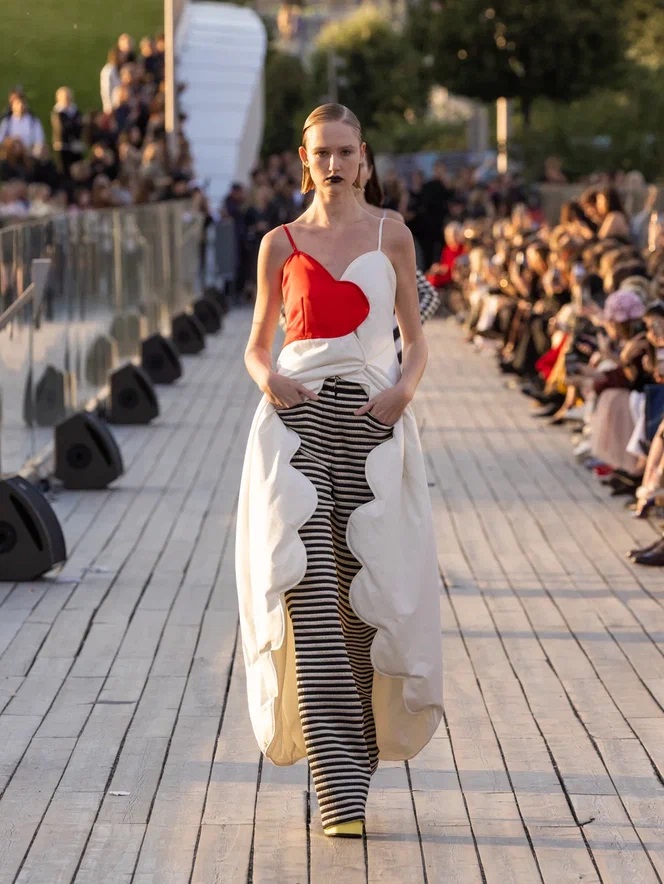
Alexander Arutyunov's collection was a deeply personal, almost literary, reflection on time and memory, created entirely from the brand's archival fabrics. He sought to "stop the flow of the new" and look inward, making each garment a tangible piece of an intimate, nostalgic archive.

Meanwhile, Alena Assi drew directly from classic Russian literature, with a collection inspired by Boris Pasternak’s novel Doctor Zhivago. Her designs captured the refined beauty and hidden drama of early 20th-century Russia, pairing flowing fabrics with richer textures.
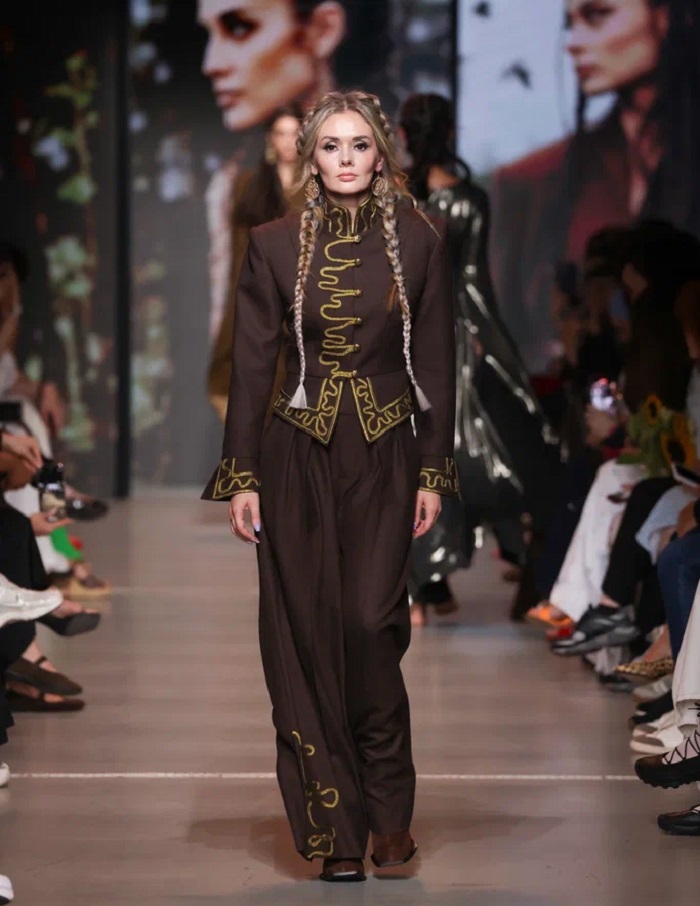
Other designers translated visual art into wearable poetry. Hatsibana's collection was a tribute to the painting "Amazon" by Ruslan Shameelev, translating its bold lines and symbolism of female strength into geometric shapes and graphic prints.

Unke from Tver presented "Metaimpressionism," a collection that reflected emotions and atmosphere in wearable art, featuring paint-splattered puffers and sculptural gowns that looked like they had been lifted from a canvas.

Khayam Khanukaev's collection, "The Muse," created a dreamscape of delicate chiffons and organzas, forming the image of a woman as a "fragile flower," while Polone paid homage to the Russian artist Viktor Vasnetsov, weaving traditional crafts like Gorodets embroidery and Vologda lace into a modern collection inspired by his fairytale paintings.
Runway as performance

Beyond the garments themselves, several designers used the runway as a stage for a full-fledged theatrical experience. The Gapanovich show, "Anticipation of the Ball," opened with a captivating dance performance, setting a dynamic tone before shifting into a collection that seamlessly blended traditional coats with balletcore-inspired tutus and pointe-shoe footwear.
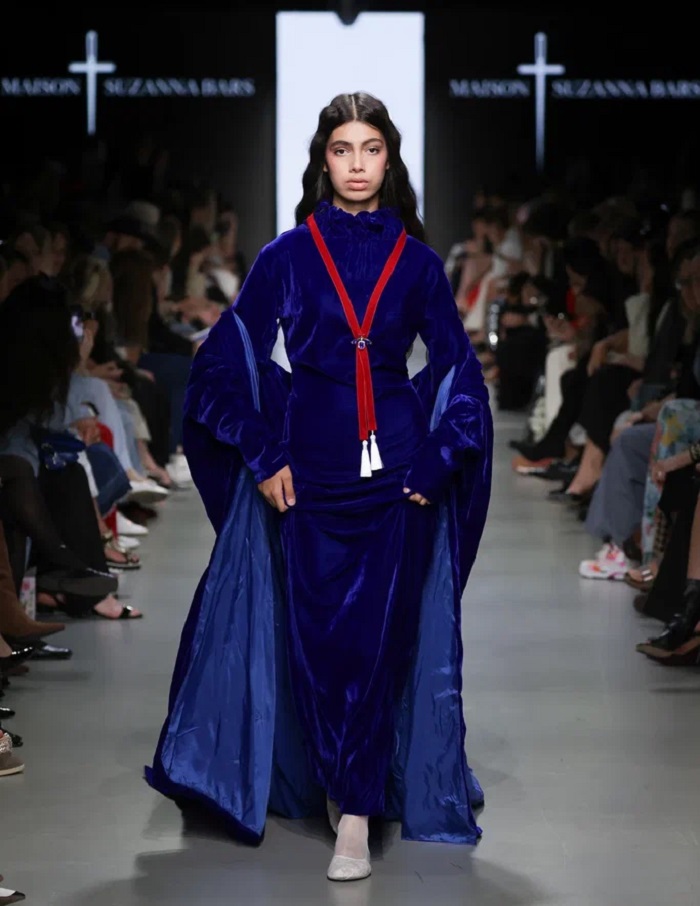
Maison Suzanna Bars presented a truly dramatic show named "Voland," weaving a narrative through a mix of silk, lace, and fur. The Phata-Morgana Project at Bolotnaya Square treated the runway itself as an art installation, covering it in velvet to celebrate pure creative energy and symbolism.
These collections collectively demonstrated that fashion can be a powerful medium for storytelling, capable of evoking complex emotions and narratives. By merging artistry with design, these creators showed that the most compelling fashion is that which has something to say, whether it's a personal memory, a piece of folklore, or a grand theatrical vision.
The recent Cinte Techtextil China fair concluded with a buzz, leaving industry professionals reflecting on the future of textiles and groundbreaking advancements. Sabine Scharrer, Director of Brand Management for Technical Textiles & Textile Processing at Messe Frankfurt, offered attendees a forward-looking presentation, spotlighting the upcoming Techtextil and Texprocess fairs in Frankfurt, Germany, which serve as the "mother show" for the global textile industry.
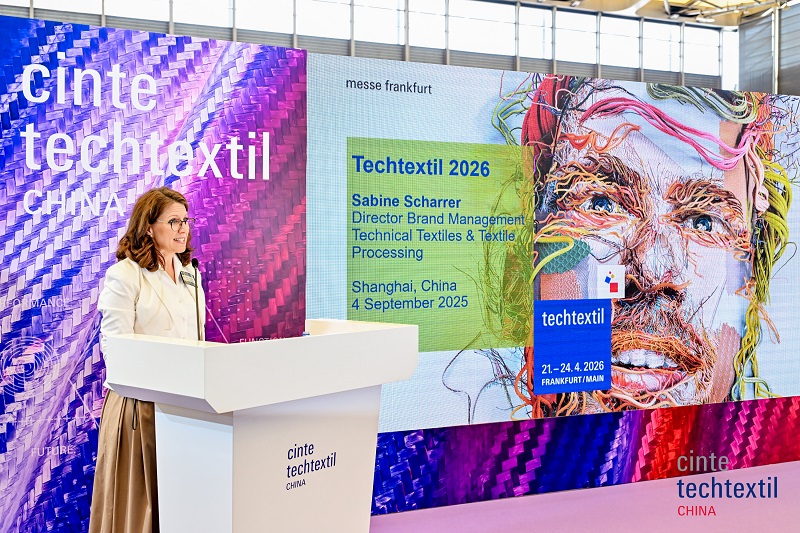
Scharrer emphasized the strength of the Texpertise network, a vast connector linking over 150,000 industry players across more than 60 trade shows in 13 countries. She highlighted the Frankfurt shows—Techtextil and Texprocess—as the global flagship events, underscoring the invaluable role of "unplanned encounters" in fostering innovation and progress within the industry.
The presentation delved into the diverse applications of technical textiles, spanning critical sectors like automotive, medicine, fashion, and construction. Texprocess, the companion fair, was introduced as the hub for machinery that transforms "textile dreams into hard-working realities" through digitalization, AI, and cutting-edge efficiency tools.
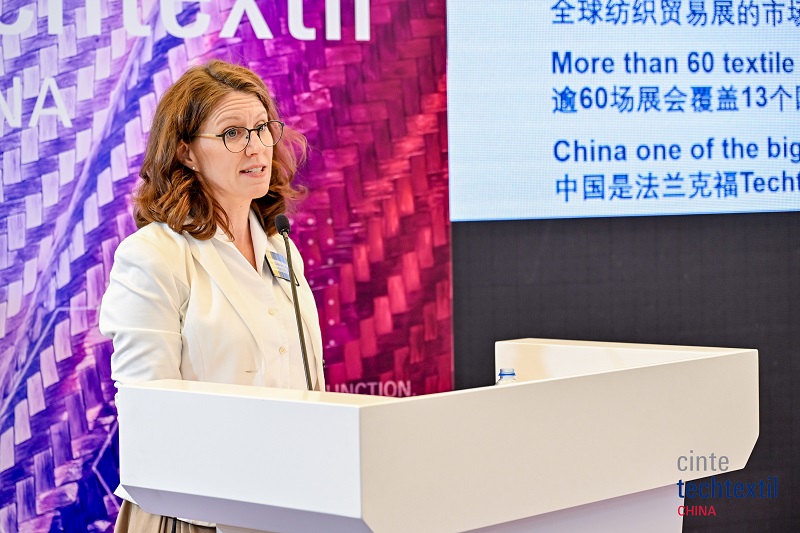
Impressive figures from the 2024 Techtextil edition were shared, reporting 1,469 exhibitors and approximately 35,000 visitors from over 100 countries, marking it as the largest and most international show to date. Scharrer noted the powerful synergy between the two fairs, with a significant overlap in visitors: 72% of Techtextil attendees also visit Texprocess, and a remarkable 90% of Texprocess attendees visit Techtextil. This interconnectedness ensures a holistic view of innovations, from material to finished product.
Looking ahead to the next Frankfurt shows, exciting additions were announced. A new, dedicated product group for Textile Chemicals and Dyes will be introduced, already attracting around 30 exhibitors. This segment will be strategically placed next to the performance apparel area, strengthening ties with a growing customer base. The Performance Apparel Textiles area itself will also move closer to Texprocess to enhance its connection with the garment industry, responding to the rapidly increasing demand for performance textiles, particularly in outdoor and personal protection.
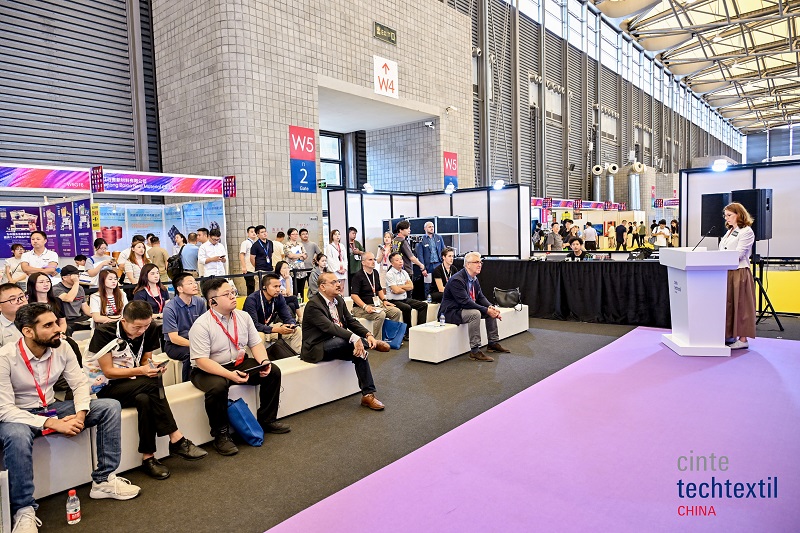
Sustainability was a central theme, woven throughout the presentation as a critical focus across all Messe Frankfurt fairs. Scharrer cited initiatives like the Econogy Tour and the Sustainability Forum as key examples of this commitment. She acknowledged the rising demand for sustainable alternatives and the growing impact of regulations, such as new textile strategies. Innovations like natural dyes, biodegradable polyester, and organic fibers were showcased, alongside discussions on challenges, including the use of "forever chemicals" (PFAS). To guide attendees, the Econogy Shift Finder was introduced—a verified directory of exhibitors offering certified sustainable products.
The next Frankfurt show in 2026 is anticipated to be a truly international gathering, with 1,500 international participants expected. The return of renowned names such as Akuma and Guttner, along with over 120 new and exciting exhibitors like Luma and Carrington, promises a dynamic event. Scharrer concluded by expressing eagerness to witness the fresh ideas and innovations these participants will bring, affirming Messe Frankfurt's role in driving the future of the textile industry.
The air in the Shanghai New International Expo Centre on September 4, 2025, hummed with a specific kind of industrial anxiety. It wasn't the noise of competition; it was the silent pressure of global compliance.
Lina Chen, founder of Lotus Technical Fabrics, felt that pressure acutely. On her tablet was an open email chain detailing the demands of a massive European public tender—a railway commission needing sustainable, high-durability seating fabric. The tender documents alone stretched to nearly forty pages. Lina’s cutting-edge bamboo composite fabric was technically superior, but the mountain of bureaucratic proof required was suffocating her small team.

She found a seat in the crowded seminar hall just as Karl Borgschulze, MD of Consulting Service Intl Ltd, took the stage to lead the Eonology Tour session.
“This is a really important part of the business here today,” Karl began, his voice calm yet firm. “Legislation around the globe is becoming more and more important.”
Lina didn’t need convincing. Her desk back in Suzhou was buried under sustainability certificates. She watched as Karl introduced the unified platform: the Texpertise Economy Network, now rebranded under the single concept of Eonology—a direct portmanteau of ‘ecology’ and ‘economy.’
Karl pivoted to history, offering a crucial perspective that resonated deeply with Lina’s entrepreneurial spirit. “Messe Frankfurt very early already recognized that sustainability is and will be a more and more important part of the global textile business,” he explained. He noted that the initiative began almost fifteen years ago, long before it became a mandate. He then delivered his central argument, a quote Lina typed onto her notes, “Textile is always ahead of other industries, let’s not forget that. We were the first ones for industrialization, we were the first ones for globalization, and we are the first ones who put the full pressure on environmental and social requirements, which is a big advantage that we are ahead of many other industries.” Lina realized the pressure wasn't a punishment; it was the cost of being a pioneer.
Karl continued, tackling the challenge of complexity head-on. He cited the bureaucratic burden currently paralyzing innovators like her. “If you go for public tenders in Europe,” he said, “sustainability requirements are a fundamental part of the tender, and you have to fill out papers, 30 pages, 40 pages.” He paused for emphasis. “If you ever have applied for something, for example for Deutsche Bahn in Germany, then you know what it means to deal with German bureaucracy.”
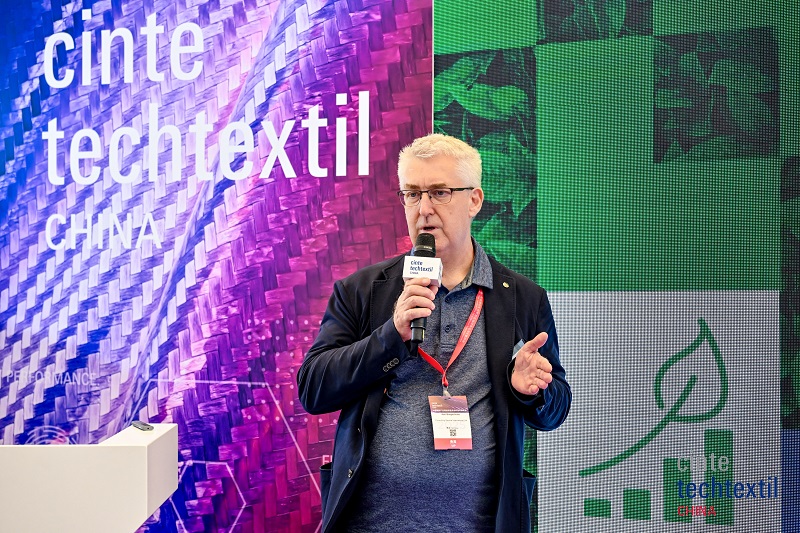
His words perfectly articulated Lina’s pain, but the key to Eonology, Karl stressed, was not avoiding the rules, but providing a framework rooted in the United Nations Sustainable Development Goals (SDGs), aligning global standards with OECD and ILO guidelines.
Then came the critical case study. Karl discussed the delicate balancing act at the heart of the Eonology principle, stating, “It’s keeping in balance ecology, social aspects, and economy.”
He elaborated on how performance sometimes necessitates trade-offs: "For example, on textile, very often performance is the most important thing, so certain other environmental aspects might be minor, because it’s more important to protect the life of a fireman or firefighter, and therefore we might have to use certain substances we wouldn’t not use in apparel for a private person.”
The firefighter analogy was a thunderbolt for Lina. Her bamboo composite met 95% of the sustainability demands, but the necessary fire-retardant finish pushed her score slightly lower on certain chemical metrics. She had been apologizing for this small deficit. Now, she realized she had to reframe it. Her fabric was for public transport—a safety application, protecting thousands of passengers daily. Performance was the most important social factor.
Lina immediately scanned the QR code for the Texpertise Network displayed on the screen. The Eonology system wasn't just a label; it was a guidance system designed to align her product's performance priority with globally recognized frameworks.

Karl Borgschulze concluded with an encouraging note: “The great thing is, if you have a problem, come here, and I'm pretty sure you will find an idea and someone who is able to support you in exactly what you are looking for. Because the industry is really innovative.”
Lina left the hall, the oppressive weight of the 40-page tender replaced by clear purpose. She wasn't just selling sustainable fabric; she was selling compliance, guided by the Eonology framework. She knew exactly which two Eonology-certified chemical suppliers to visit next, not to find greener alternatives, but to find partners who could document the necessity of her chosen, life-protecting treatment within the accepted, performance-driven Ecology-Social-Economy balance. The battle against bureaucracy wasn't won with just a better product, but with a better system.
Moscow Fashion Week, held from August 28 to September 2, 2025, served as a powerful showcase for designers who masterfully explored the art of contradiction. The event, held in conjunction with the BRICS+ Fashion Summit, highlighted how designers from Russia and beyond are using opposing forces—fragility and strength, tradition and modernity, softness and structure—to create dynamic and compelling fashion.
From Rococo to grunge

Designers found a compelling narrative in the juxtaposition of different eras and aesthetics. Alina Vladi Brand Wear from Kazan opened its show with a dreamy Rococo theme, featuring airy silhouettes, pearl beads, and soft tones. But the collection quickly took a rebellious turn, shifting to heavy fabrics, frayed edges, and chains that channeled the spirit of grunge. This dramatic contrast reflected the duality of the modern woman, capable of embodying both elegance and a fierce, unapologetic strength.
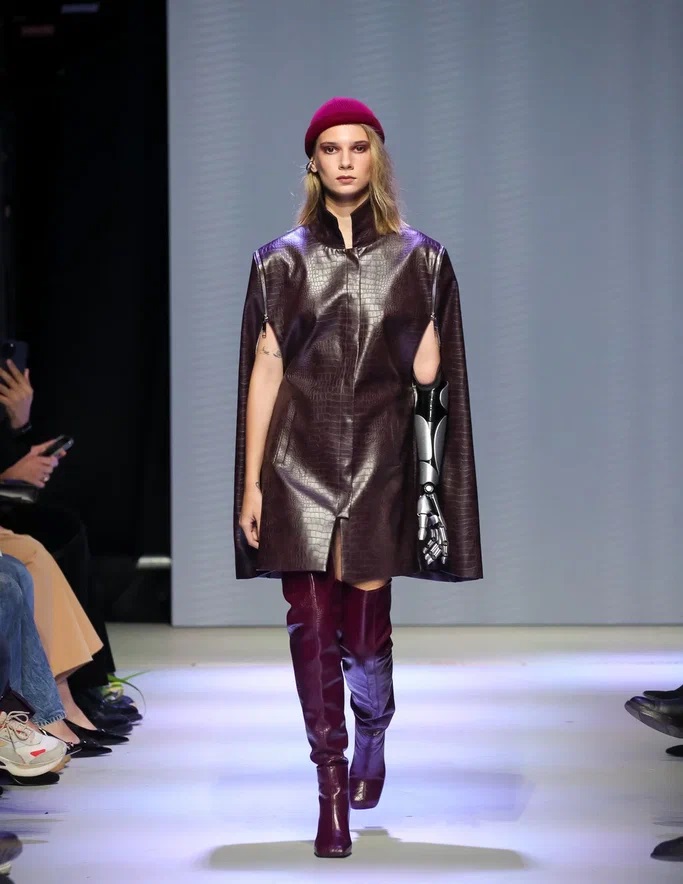
Similarly, the Addicted to... brand combined glamorous, sensational trends with a casual, everyday style, pairing luxurious fur coats with rebellious snake-print dresses and sequined suits with casual beanies.
Balancing softness and structure
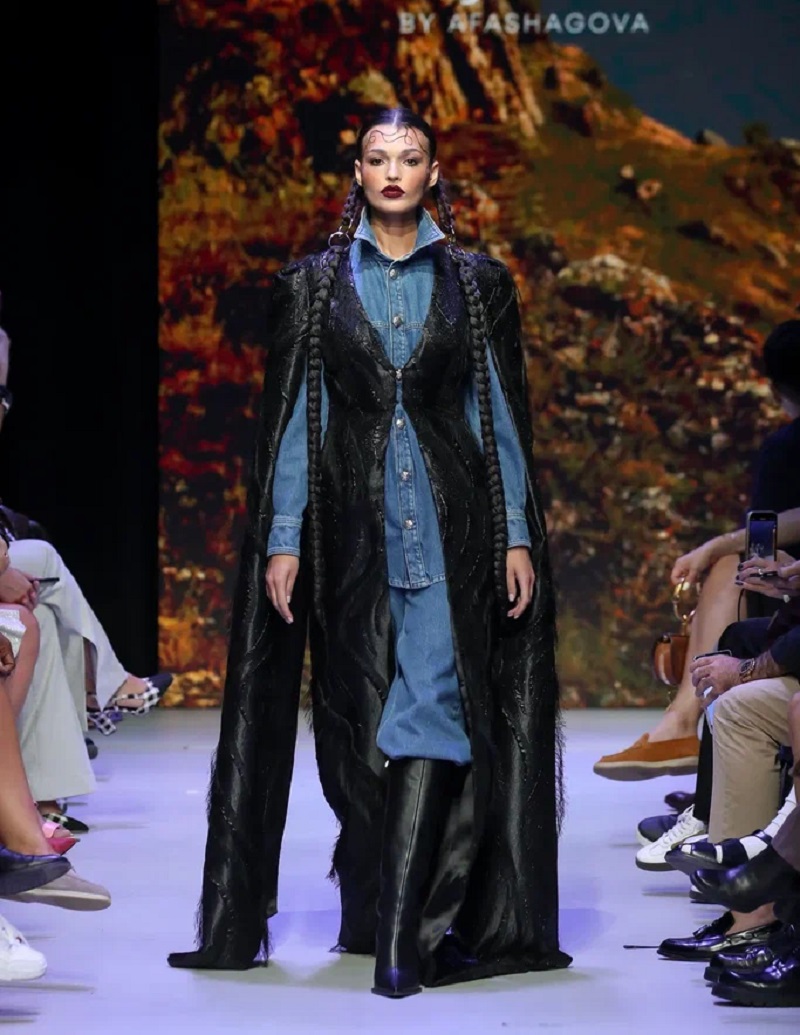
Many collections explored the tension between delicate and rigid materials to create a sense of harmony. SaiJamin, a brand rooted in Circassian heritage, used its "Threads" collection to balance bohemian softness with sharp, architectural lines. Flowing dresses were paired with structured bustiers and statement belts, creating an elegant dialogue between vulnerability and power.

In a similar vein, Akkulova Albina wove together Slavic refinement and Caucasian elegance, using asymmetrical cuts and layered silhouettes to build architectural structure into her pieces.

The Academy of Branding and Design METRICS focused on the interplay between contrasting textures, pairing lightweight chiffons with denser materials to create a sophisticated balance. And Alena Nega's "Bliss" collection used a similar approach, combining semi-transparent fabrics with substantial suiting materials to craft an enigmatic and compelling aesthetic. The RUBAN brand took this concept to a new level, using layers of weightless organza and chiffon to create a three-dimensional effect that was both airy and sculptural.
Timelessness Through Contrast
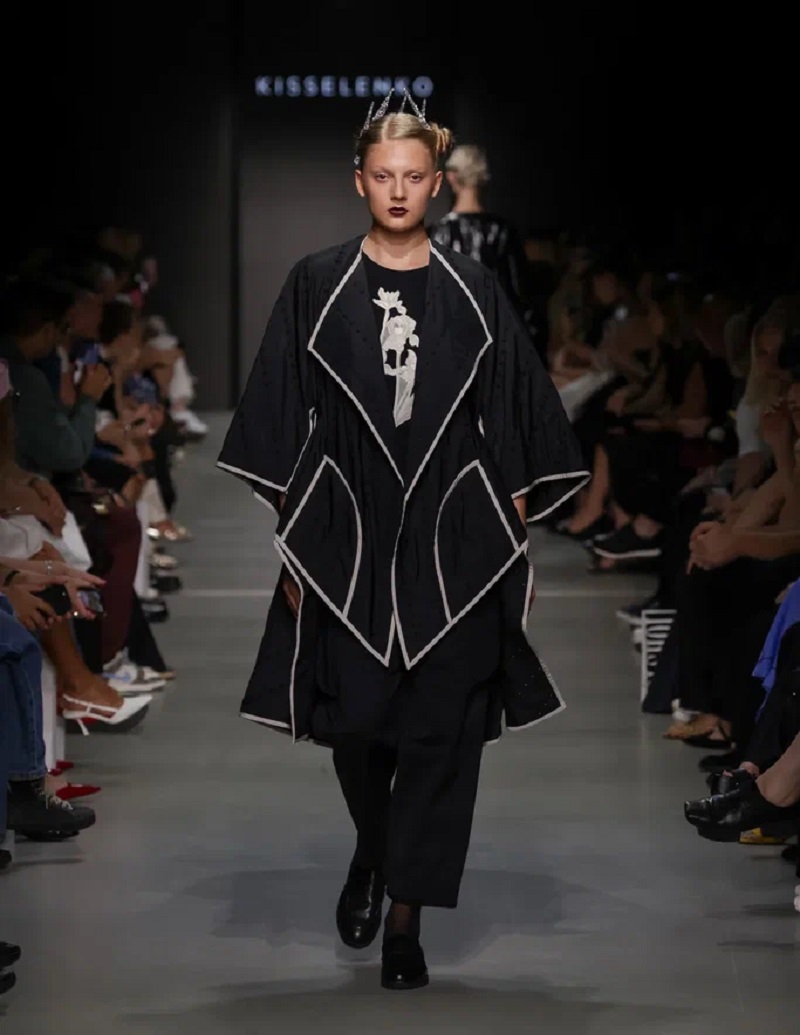
Other designers explored the tension between past and present to create collections that felt timeless. The St. Petersburg brand Kisselenko used a minimalist approach and Oriental touch, blending strict geometry with asymmetrical tailoring to create pieces that could be layered and combined in countless ways. This fusion of tradition and modernity allowed for versatile, long-lasting fashion.

Finally, Surovaya's collection celebrated "timeless classics" rather than fleeting trends. By using a monochromatic palette and elegant, clean silhouettes, the designer proved that a focus on impeccable tailoring and quality can create a powerful statement without relying on passing fads.









